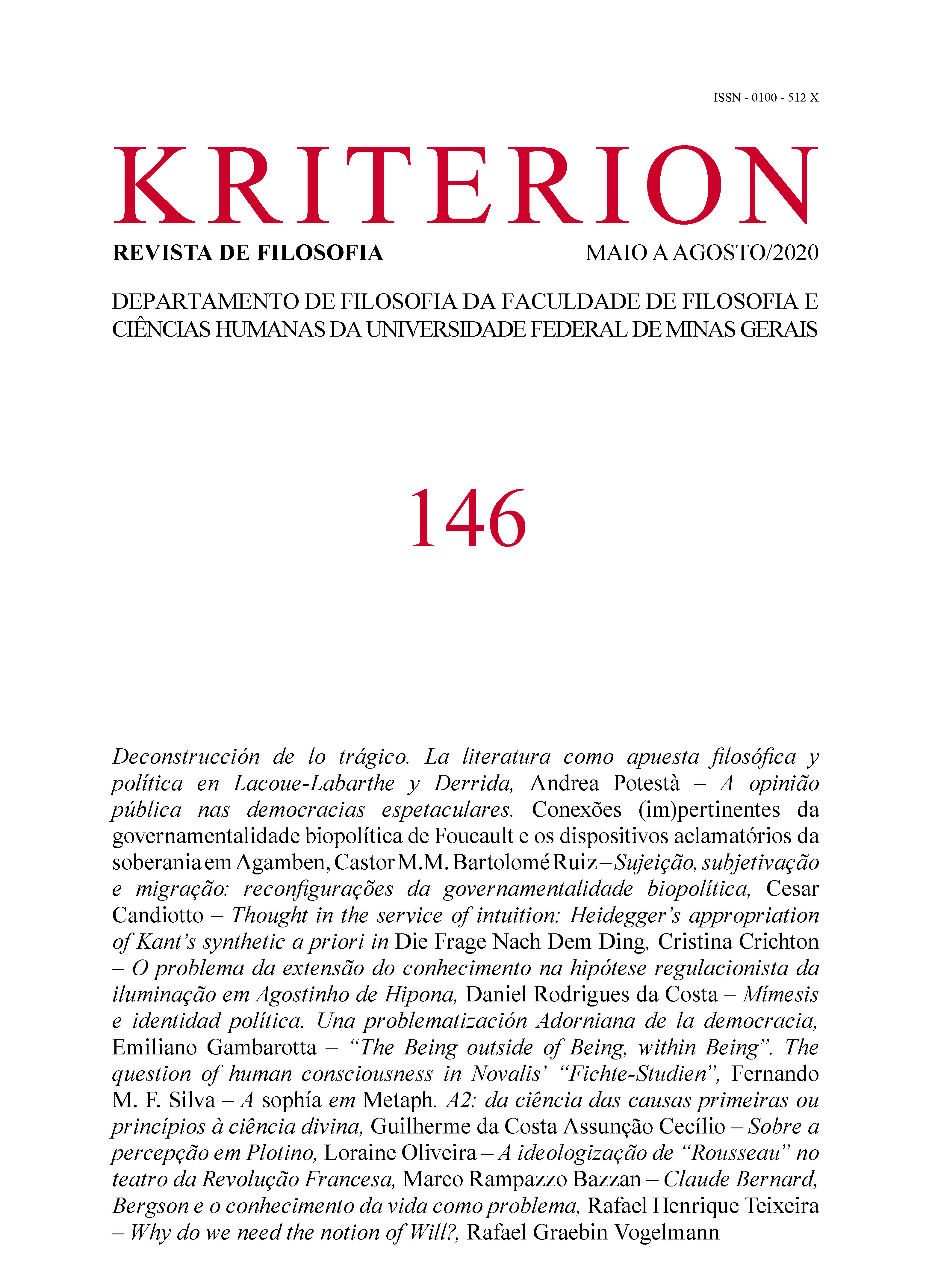THOUGHT IN THE SERVICE OF INTUITION: HEIDEGGER’S APPROPRIATION OF KANT’S SYNTHETIC A PRIORI IN DIE FRAGE NACH DEM DING
Keywords:
Heidegger, Kant, synthetic a priori, everyday experience, transcendenceAbstract
There is general agreement that Kant’s thought strongly influenced Heidegger’s. Nevertheless, there is still much work to be done in order to fully appreciate this influence. A central theme to disclose the relation between these authors is the role they give to the transcendental. In this paper I show that Kant’s account of intuition is the focus of Heidegger’s interpretation of Kant in his Die Frage nach dem Ding, since Heidegger interprets Kant’s treatment of intuition as a delimiting of the modern mathematical tendency to determine everything out of pure reason alone. I argue that this interpretation is at the basis of Heidegger’s appropriation of Kant’s synthetic a priori in this work, the aim of which is to take this notion away from the sphere of the objects of mathematical physical science, and place it in the realm of everyday experience. I claim that Heidegger thinks that this move can only be accomplished by removing universality and necessity (epistemic certainty) from Kant’s a priori. Finally, I show that Heidegger’s appropriation of Kant’s synthetic a priori goes together with and illuminates his understanding of transcendence as das Zwischen, ‘the between us and things’.
Downloads
References
BARTON Jr, W.B. ‘An Introduction to Heidegger’s What is a Thing?’. Southern Journal of Philosophy, Vol. 11, 1, 2, 1973, pp. 15-25.
BLATTNER, W. ‘Heidegger’s Kantian idealism revisited’. Inquiry: An Interdisciplinary Journal of Philosophy, 47:4, 2004, pp. 321-337.
CARR, D. “Heidegger on Kant and Transcendence”. In: Crowell, S. & Malpas, J. (eds.). Transcendental Heidegger. New York, NY: Stanford University Press, 2007. pp. 28-42.
CRICHTON, C. “Heidegger on representation: the danger lurking in the a priori”. Tópicos, Revista de Filosofía, 56, enero-junio, 2019, pp. 167-195.
CROWELL, S., MALPAS, J. “Introduction”. In: Crowell, S., Malpas, J. (eds.). Transcendental Heidegger. New York, NY: Stanford University Press, 2007. pp. 1-9.
DAHLSTROM, D. “Heidegger's Kantian Turn: Notes to His Commentary on the ‘Kritik Der Reinen Vernunft’”. Review of Metaphysics, 45:2, 1991, pp. 329-361.
______. “Heidegger’s Transcendentalism”. Research in Phenomenology, 35:1, 2005, pp. 29-54.
______. “Transcendental Truth and the Truth That Prevails”. In: Crowell, S., Malpas, J. (eds.). Transcendental Heidegger. New York, NY: Stanford University Press, 2007. pp. 63-73.
GARDNER, S. “Kant and the Critique of Pure Reason”. London UK: Routledge, 1999.
GLAZEBROOK, T. “Heidegger’s Philosophy of Science”. New York, NY: Fordham University Press, 2000.
GOLOB, S. “Heidegger on Kant, Time and the ‘Form’ of Intentionality”. British Journal for the History of Philosophy, DOI: 10.1080/09608788.2012.692662, 2012.
HEIDEGGER, M. (1927/28). “Phenomenological Interpretation of Kant’s Critique of Pure Reason.” Translated by Parvis Emad and Kenneth Maly, Bloomington, IN: Indiana University Press, 1997a.
______. (1927/28). "Phänomenologische interpretation von Kants Kritik der Reinen Vernunft." Published by Ingtraud Görland, Frankfurt am Main: Vittorio Klostermann GmbH, 1995.
______. (1927). “Being and Time”. Translated by John Macquarrie and Edward Robinson, Oxford: Blackwell Publishing, 2011.
______. (1927). "Sein und Zeit". Published by Friedrich-Wilhelm von Herrmann, Frankfurt am Main: Vittorio Klostermann GmbH, 1977.
______. (1929). “Kant and the Problem of Metaphysics”. Translated by Richard Taft, Bloomington, IN: Indiana University Press, 1997b.
______. (1929). "Kant und das Problem der Metaphysik". Published by Friedrich-Wilhelm von Herrmann, Frankfurt am Main: Vittorio Klostermann GmbH, 1991.
______. (1935/36). “What is a thing?”. Translated by W. B. Barton and V. Deutsch, South Bend, IN: Gateway Editions, 1967.
______. (1935/36). “The Question Concerning the Thing. On Kant’s Doctrine of the Transcendental Principles”. Translated by J. D. Reid and B. D. Crowe, London-New York: Rowman & Littlefield International, 2018.
______. (1935/36). "Die Frage nach dem Ding. Zu Kants Lehre von den transzendentalen Grundsätzen." Published by Petra Jaeger, Frankfurt am Main: Vittorio Klostermann GmbH, 1984.
______. (1961). “Kant’s Thesis about Being”. In: Pathmarks. Translated by Ted E. Klein Jr. and William E. Pohl, Cambridge: Cambridge University Press, 1998.
______. (1961). "Kants These über das Sein". In: Wegmarken. Published by Friedrich-Wilhelm von Herrmann, Frankfurt am Main: Vittorio Klostermann GmbH, 1976.
KANT, I. (1781/1787). “Critique of Pure Reason”. Translated and edited by Paul Guyer and Allen Wood, Cambridge: Cambridge University Press, 1998.
LAFONT, C. “Heidegger and the Synthetic A Priori”. In: Crowell, S. & Malpas, J. (eds.). Transcendental Heidegger. New York, NY: Stanford University Press, 2007, pp. 104-118.
MCLEAR, C. “The Kantian (Non)-conceptualism Debate”. Philosophy Compass, 9:11, pp. 769-790, 10.1111/phc3.12166, 2014.










